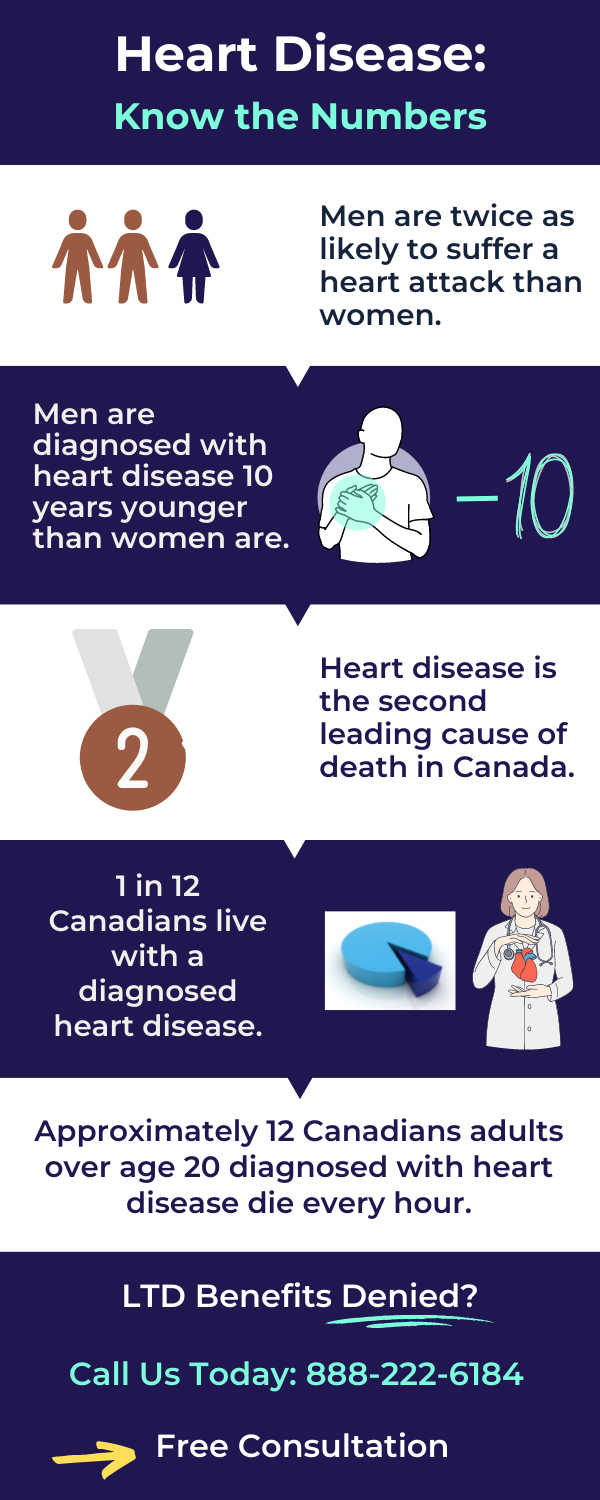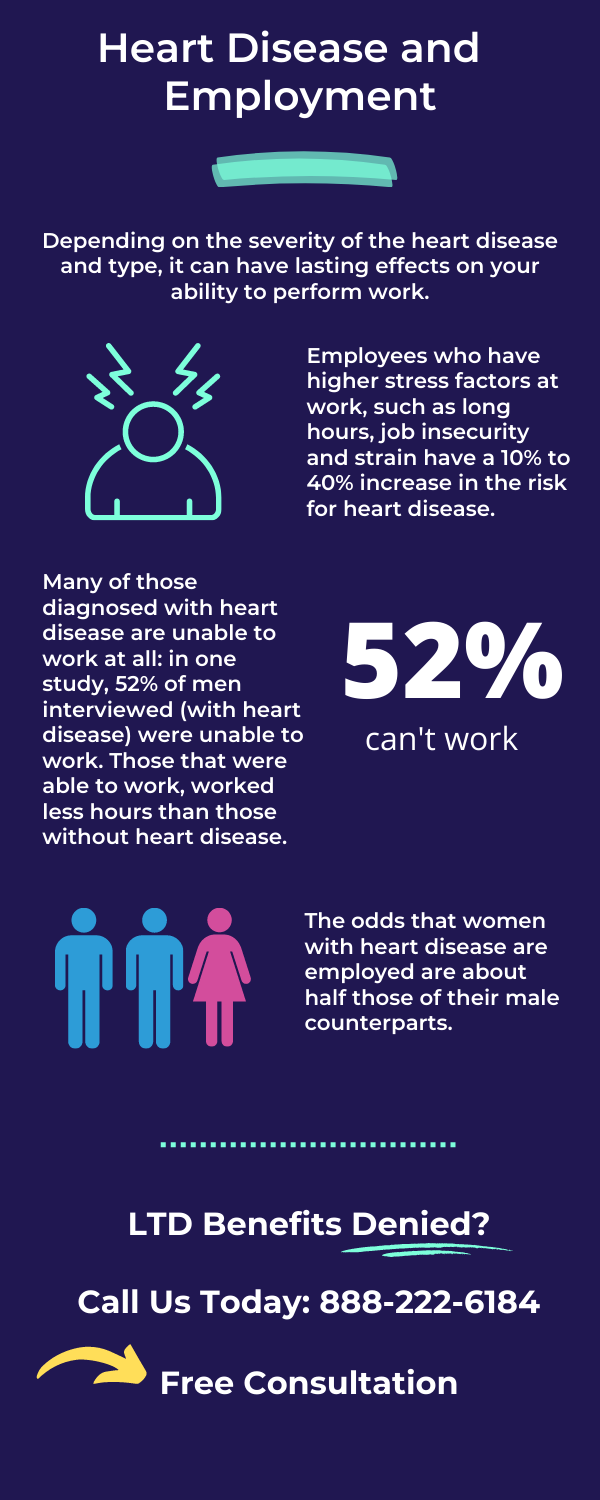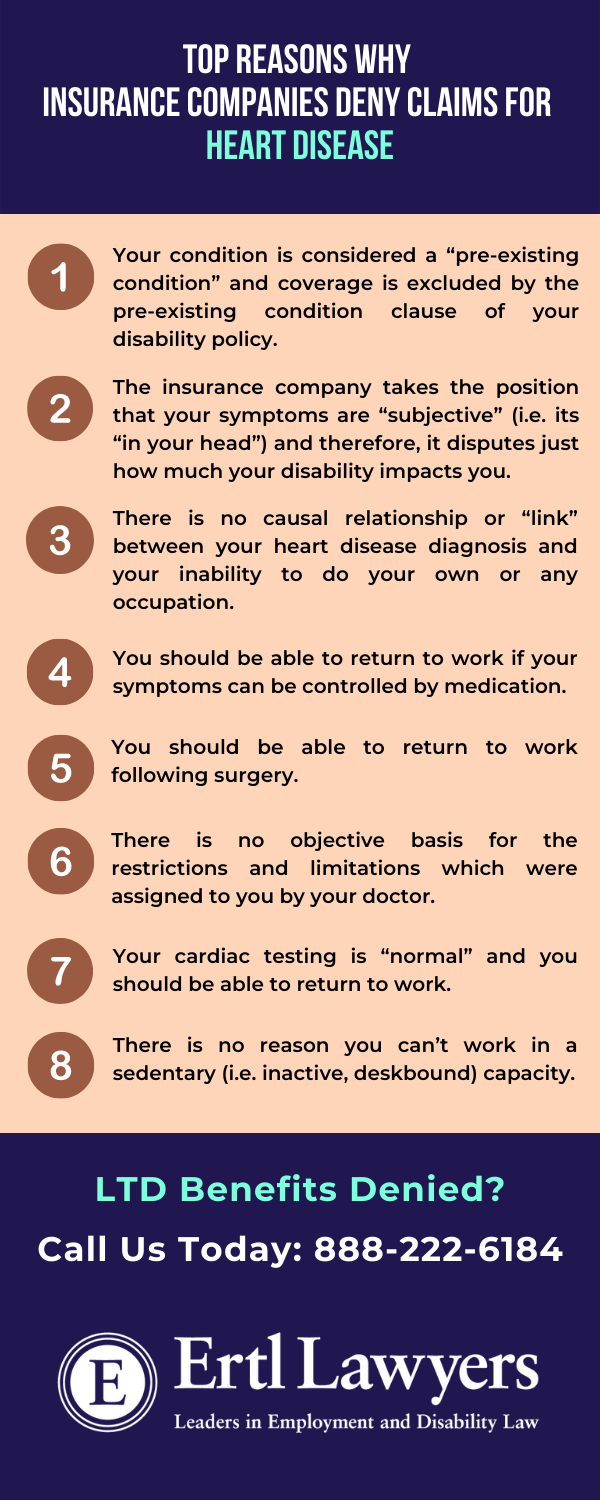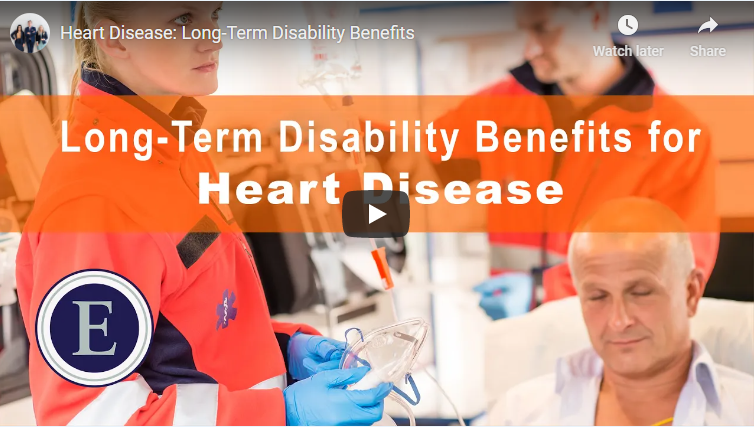Long-Term Disability Benefits for Heart Disease
Can I Get Long-Term Disability Benefits for Heart Disease in Canada?
Heart disease presents a major health obstacle for millions across Canada.
For those experiencing severe heart disease, holding down a job might seem unattainable, leading them to question, “Am I entitled to long-term disability for heart disease in Canada?”
This in-depth guide will discuss what heart disease is, the challenges it creates in the workplace, whether it can qualify for long-term disability benefits, the steps you might consider if you plan to apply for benefits, why insurance companies often deny benefits for heart disease, and we’ll point out the value of consulting experts like Ertl Lawyers, which can greatly enhance your experience during this process.
Heart Disease: Overview
a) What is Heart Disease?
Heart disease encompasses a wide variety of diseases that involve the heart and blood vessels. The most common include ischemic heart disease (often leading to heart attack), stroke, peripheral vascular disease, heart failure, rheumatic heart disease and congenital heart disease.
Heart disease involves any condition that affects the structure or function of the heart. Each condition often has its own cause but can be grouped together based on how it affects the structure or function of the heart.
- Coronary artery and vascular disease: hardening of the arteries (atherosclerosis). Coronary artery occurs when the arteries in your heart are narrowed or blocked. This is the most common heart disease and often causes a majority of heart attacks as well as angina. Vascular disease is when there are issues in other blood vessels causing a reduction of blood flow affecting your heart.
- Heart rhythm disorders (arrhythmias): when the heart beats too slowly, too quickly or disorganized. Arrhythmias cause a disruption in blood flow to the heart.
- Structural heart disease: abnormalities in the heart structure such as valve, wall, muscle or blood vessel issues. These structural heart diseases can be at birth (congenital) or can occur after birth through infection, wear and tear, etc.
- Heart failure: occurs when the heart is damaged or weakened. Two most common causes of heart failure are heart attack and high blood pressure.

See: Heart and Stroke Foundation of Canada and Canada Public Health Service
b) Most Common Symptoms of Heart Disease
The symptoms you experience will depend on the type of heart disease you have. The most common symptoms of those diagnosed with heart disease include chest pain, fainting and shortness of breath.
c) Criteria for a Diagnosis of Heart Disease
A heart disease diagnosis depends on the type of signs and symptoms you are displaying. Your doctor will review your medical and family history and perform a complete physical exam. Your doctor may also run tests including:
- Angiography
- Cardiac catheterization
- Doppler ultrasound
- Echocardiogram
- Electrocardiogram
- Holter or event monitor
Workplace Restrictions and Limitations Caused By Heart Disease
Individuals with heart disease may encounter various limitations and restrictions in their workplaces, which can vary based on the severity of their condition, the nature of their job, and how effectively they manage their symptoms. Below are some common challenges that people with heart disease may experience in their work environments:
Reduced Stamina and Fatigue
Conditions such as congestive heart failure or coronary artery disease can lead to diminished stamina, making it challenging for individuals to endure long hours of physical activity. This is particularly relevant for employees who need to stand for extended periods, perform physical labor, or engage in tasks requiring sustained exertion.
Shortness of Breath
Many heart conditions, like heart failure or arrhythmias, can induce shortness of breath, especially during physical activities. This can complicate tasks such as climbing stairs, walking long distances, or lifting heavy items.
Pain or Discomfort
Chest pain or discomfort is a frequent symptom of heart disease, especially during exertion. This discomfort can range from mild to severe and may significantly hinder an individual’s ability to carry out work tasks.
Limited Ability to Work Long Hours
For those with heart disease, extended working hours can lead to fatigue, heightened stress, and the risk of overexertion. This is particularly true for individuals recovering from a heart attack, undergoing treatment, or managing chronic heart conditions.
Cognitive Effects (Brain Fog or Focus Issues)
Certain heart conditions or related treatments, such as medications, can affect cognitive abilities, resulting in memory issues, difficulties with concentration, or slower decision-making. These cognitive challenges may hinder job performance, especially in roles that require critical thinking or multitasking.
Depression and Mental Health Struggles
Heart disease is often associated with depression and other mental health issues due to the emotional burden of managing a chronic condition. Individuals may feel frustrated, helpless, or experience a low mood, which can impact their work performance and relationships with colleagues.

Is Heart Disease Recognized as a Disability?
Heart disease can significantly affect a person’s work and everyday activities. Therefore, it may be eligible for long-term disability benefits, assuming your insurance policy does not explicitly exclude it.
For individuals with severe or ongoing heart disease, managing daily tasks or maintaining consistent employment can become challenging. To qualify for long-term disability benefits, you need to meet specific criteria that demonstrate the seriousness of your condition.
Key factors to consider include:
- Medical Diagnosis: You need a formal diagnosis of heart disease from a qualified healthcare provider.
- Functional Limitations: Your condition must affect your ability to carry out essential job responsibilities.
- Treatment Efforts: It’s important to show that you are actively engaged in recommended treatments, which may include therapy or prescribed medications.
If your symptoms prevent you from fulfilling your job requirements, you may be eligible for disability benefits.
Long-Term vs. Short-Term Disability for Heart Disease
In Canada, many employers offer both short-term and long-term disability insurance as part of their benefits packages.
- Short-Term Disability Benefits typically provide financial support for a few weeks or months, helping individuals while they pursue treatment and recover.
- Long-Term Disability Benefits are designed for those with ongoing conditions that prevent them from working for a more extended timeframe. Claims for fibromyalgia are usually filed under long-term disability if symptoms last beyond the coverage of short-term insurance. To obtain long-term disability benefits for fibromyalgia, it is essential to have comprehensive documentation and medical evidence.
Heart Disease and Workplace Discrimination
It is unlawful to discriminate against someone in the area of employment based on their physical disability: Ontario’s Human Rights Code and the Canadian Human Rights Act.
If you are suffering from heart disease, you might face discrimination in a variety of ways:
- You are terminated from your job because you have heart disease.
- You are denied accommodation because of your heart disease.
- After returning from a disability leave, your employer places you in a lower, part-time position at a lower rate of pay
- Someone makes unwelcome remarks or jokes about your disability.
- Someone offends or humiliates you physically or verbally threatens or intimidates you because of your disability.
- Retaliating against you for filing a human rights
Ertl Lawyers are experts in Employment and Disability Law. If you have been discriminated against, we can help, including:
- Having your employer comply with their duty to accommodate you.
- Having your employer stop all forms of discriminatory conduct.
- Representing you in wrongful dismissal, constructive dismissal, and human rights matters.
- Ensuring that your employer complies with its statutory obligations, including its obligations under the Employment Standards Act.
- Negotiation severance packages (including continuation of benefits).


How to Apply for Long-Term Disability Benefits for Heart Disease in Canada
Applying for long-term disability (LTD) benefits can be daunting, but breaking down the process can make it more manageable. Here’s an overview of the key steps to start your application:
Review Your Insurance Policy
Begin by carefully examining your employer-sponsored insurance plan or personal disability insurance policy. These documents usually outline the requirements you need to meet to qualify for LTD benefits related to fibromyalgia. Pay special attention to:
- Definitions of “disability”
- The waiting periods before benefits begin
- Necessary medical documentation
Tip: If you have any questions, don’t hesitate to reach out to your HR department or insurance provider for assistance.
Collect Medical Documentation
A vital aspect of any disability claim is acquiring thorough medical documentation. Ensure your healthcare providers include:
- A diagnosis of fibromyalgia
- An assessment of the severity and impact of your symptoms
- Treatment plans (including medications, therapy, or other interventions)
- Professional evaluations of your ability to work
You might also want to get a detailed report from your psychiatrist or therapist that outlines how your condition affects your job performance.
Follow Your Treatment Plan
Insurance companies often look for proof that claimants are actively managing their conditions. Attending therapy sessions, adhering to prescribed treatments, and following medical advice show that you are taking steps towards recovery.
Initiate the Claim Process
Most long-term disability applications require you to submit forms to your insurer—typically completed by you, your healthcare provider, and occasionally your employer. These forms will ask detailed questions about your condition and how it affects your ability to work.
Tip: Be as thorough as possible when filling out these forms. Incomplete or vague answers can result in delays or denials.
Prepare for Follow-Up Requests
If the insurer requests additional information or documentation, don’t be discouraged. Being proactive and responsive can help avoid unnecessary delays in processing your claim.
Consider Appealing if Necessary
If your long-term disability claim is denied, remember you have the right to appeal the decision. Consulting an experienced disability lawyer may improve your chances of success during the appeals process.
What Other Benefits Might I Be Entitled to for Heart Disease?
Other than short-term and long-term disability benefits through a group or individual insurance plan, people suffering from heart disease might be entitled to one or more of the following benefits:
- Employment Insurance (EI) Sickness Benefits;
- Ontario Disability Support Plan (ODSP);
- Disability Tax Credit (DTC);
- Disability Creditor Insurance (under your mortgage or credit cards);
- Trillium (extended health benefits);
- Canada Pension Plan Disability (CPP-D); and
- Disability Pension (employer).
Heart Disease Resources
- The Heart and Stroke Foundation of Canada
- Public Health Agency of Canada
- Cardiac Health Foundation of Canada

How a Long-Term Disability Lawyer Can Help You
Navigating the disability claims process can be challenging, especially when dealing with fibromyalgia. This is where working with an expert, like a long-term disability lawyer in Ontario, can make a significant difference.
Here’s how legal professionals can support you:
Understanding Your Policy
Attorneys can help you understand the intricate specifics in your insurance documents, clarifying the benefits available to you.
Building a Strong Appeal
If your initial claim gets denied, a skilled long-term disability attorney can collect supporting evidence, consult with medical experts, and file a compelling appeal on your behalf.
Taking Legal Action
Rather than relying solely on the insurance appeal process, a long-term disability attorney can initiate legal proceedings for you.
Interacting with Insurance Companies
Many insurance companies prioritize profits over payouts, so a knowledgeable attorney can navigate their strategies and negotiate on your behalf effectively.
Conserving Time and Energy
Managing a disability claim while coping with the challenges of fibromyalgia can be daunting. Legal representation allows you to focus on your health, with the assurance that your case is in the hands of professionals.
Addressing Issues with Your Employer
Seek a disability attorney who also specializes in employment law. They can assist you with matters related to your disability, including wrongful termination, severance discussions, accommodations, and discrimination issues.


Pursuing Disability Benefits with Confidence
Heart disease is a major health issue that deserves recognition and support. If you are struggling in your job, having trouble meeting work demands, or seeking disability benefits due to heart disease, know that there are resources out there to help you.
If you’re unsure about your next steps, think about contacting experienced legal professionals, such as Ertl Lawyers, who can guide you through the claims process and safeguard your rights. While seeking help might seem daunting at this moment, it could be crucial for enhancing your future.
Contact Ertl Lawyers today for a free case assessment.
Disclaimer: The content on this website is provided for general information purposes only and does not constitute legal, medical, or other professional advice or an opinion of any kind. Users of this website are advised to seek specific legal advice by contacting members of Ertl Lawyers (or their own legal counsel) regarding any specific legal issues. Ertl Lawyers does not warrant or guarantee the quality, accuracy or completeness of any information on this website.
Long-Term Disability Benefits Denied?
Ertl Lawyers provides expert representation in long-term disability matters.
The vast majority of disability matters are resolved through negotiation and mediation – and that’s because insurance companies know that we are passionate about our clients’ rights.
How we can help you:
• free disability policy analysis
• free case assessment
• applying for disability benefits
• appealing a denial or termination of your benefits
• disputing a denial through a legal claim
• handling all communications with your employer
• protecting your employment
• prosecuting human rights claims
Fair, Flexible Rates – Including Contingency Fees
(Don’t Pay Unless You Win)
Our Help Can Make All The Difference.
Related Blogs
Sale of Business: What Rights Do Employees Have?
To a business owner, the sale of their business can be the well-deserved payout of a life's worth of blood, sweat and tears. For the employees and their families, however, even assurances of job security may not be enough to relieve feelings of uncertainty and worry...
What To Know About the Employment Equity Act in Canada
If you want a summary of the intent behind Canada's Employment Equity Act (EEA), you need not look any further than section 2 of the EEA, the "Purpose of Act" (last updated in 2017): "The purpose of this Act is to achieve equality in the workplace so that no person...
Performance Improvement Plans in the Banking Industry
At face value, performance improvement plans (PIPs) are meant to be a tool that helps struggling employees meet specific performance-related goals. In the banking and finance industry, this commonly means meeting targets and sales quotas of various financial products....




